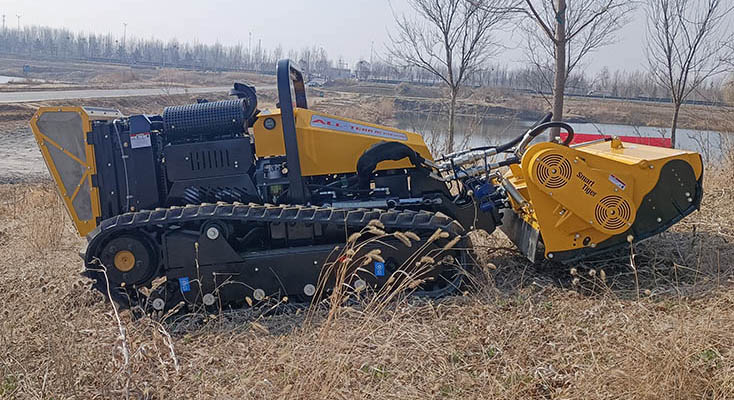Smart Remote Control Lawn Mowers Transforming Farm Management Efficiency
Agriculture is evolving rapidly in the 21st century, with modern farms embracing innovative technologies to improve efficiency, reduce labor costs, and enhance productivity. Among these innovations, smart remote control lawn mowers are emerging as a game-changer. Designed for versatility, safety, and precision, these machines allow farmers to manage large fields, orchards, and pastures more effectively than ever before.
Traditionally, mowing was a labor-intensive task requiring significant manpower and time. With the advent of smart remote control technology, farmers can now operate mowers from a distance, safely navigating steep slopes, uneven terrain, and hazardous areas. This not only improves operational safety but also reduces the number of workers needed for routine maintenance, allowing farms to allocate labor to more critical activities.
Advancements in Smart Mower Technology
Smart remote control mowers combine mechanical efficiency with digital intelligence. Key features include:
- Wireless Operation: Operators can control the mower from a safe distance using smartphones, tablets, or dedicated remote controls.
- Obstacle Detection: Advanced sensors identify obstacles and adjust mowing paths automatically, preventing damage and downtime.
- Automated Routes: GPS-based systems optimize mowing patterns for maximum efficiency and minimal fuel consumption.
- Energy Efficiency: Many models feature hybrid or electric powertrains, reducing emissions and long-term operational costs.
- Customizable Settings: Cutting height, speed, and blade configuration can be adjusted remotely to suit different terrains and crops.
Benefits for Farm Management
The adoption of smart remote control lawn mowers brings several benefits to modern agriculture:
1. Labor Efficiency: Fewer operators are required to maintain large areas, freeing labor for other essential farming tasks.
2. Improved Safety: Remote operation minimizes exposure to hazardous environments such as steep hills, waterlogged fields, or dense vegetation.
3. Higher Productivity: Optimized mowing routes and autonomous operation ensure that large areas are covered more quickly and consistently.
4. Cost Savings: Reduced fuel consumption and lower labor costs contribute to long-term economic benefits.
5. Sustainability: Electric and hybrid models decrease carbon emissions, supporting environmentally friendly farming practices.

Q&A Section
Q: How do remote control mowers improve safety on farms?
A: Operators can control machines from a safe distance, reducing exposure to dangerous terrain, machinery accidents, and harsh environmental conditions.
Q: Can remote control mowers handle uneven or sloped land?
A: Yes. Advanced models feature adaptive suspension and obstacle detection, allowing them to work effectively on slopes, hills, and irregular fields.
Q: Are these mowers suitable for both small and large farms?
A: Absolutely. Compact models are perfect for small farms or orchards, while heavy-duty versions can manage extensive pastures and large agricultural operations efficiently.
Global Market Trends
The global market for smart remote control lawn mowers is expanding rapidly. Rising labor costs, the need for precision farming, and increased adoption of eco-friendly technologies are driving demand. North America and Europe are leading the market due to high mechanization levels and environmental regulations, while Asia-Pacific shows strong growth potential with large-scale agricultural expansion and increasing investment in modern farming equipment.
Case Study: Improving Operational Efficiency
A vineyard in Italy integrated remote control rotary mowers into their daily operations. Within months, the vineyard observed a 30% reduction in labor hours spent on mowing, improved consistency of grass and weed management, and lower fuel consumption due to optimized mowing paths. Remote operation also allowed workers to focus on pruning, irrigation, and harvesting, improving overall farm efficiency.
Future Outlook
Looking ahead, smart remote control mowers are expected to become even more sophisticated. Integration with AI, IoT sensors, and predictive analytics will allow farms to plan mowing schedules automatically based on soil conditions, weather forecasts, and crop cycles. Autonomous and semi-autonomous models will further reduce human intervention, making farm management faster, safer, and more sustainable.
Q&A Section
Q: Do these mowers integrate with other precision agriculture tools?
A: Yes. Many remote control mowers can communicate with farm management software, GPS systems, and sensor networks to optimize field operations.
Q: How do smart mowers support sustainability?
A: By reducing fuel usage, limiting unnecessary passes, and incorporating electric or hybrid power, these mowers lower carbon emissions and environmental impact.
Q: Is training required to operate remote control mowers?
A: Minimal training is needed. Most devices feature intuitive controls, automated functions, and safety alerts to guide users.
Conclusion
Smart remote control lawn mowers are revolutionizing farm management by combining efficiency, safety, and precision. They help farms reduce labor costs, optimize productivity, and meet sustainability goals while adapting to diverse agricultural environments. As modern farms continue to adopt advanced technologies, these mowers will play an increasingly vital role in transforming agricultural operations worldwide.
5. Get Your Personalized Solution Now
→ Call the selection hotline: +86 158 5359 8030 (also supports accessory customization inquiries).








